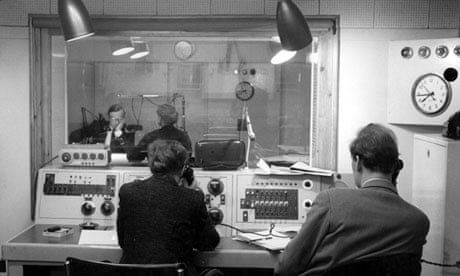It was one of those "sounds great on paper" ideas. Ninety tiny, 90-second programmes featuring archive content from 1922 to 2012 to be broadcast in celebration of 90 years of BBC radio. The problem was choosing which speech radio moments to include.
It was far, far too much listening for one person, so we assembled a dozen or so producers, each with different interests and expertise and asked them to "bid" for years. The result, 90 x 90, which starts airing across the BBC's networks tomorrow, is a team-built jigsaw puzzle celebrating the best in speech radio.
When it came to picking the standout broadcasts from each year, we made things more difficult by limiting the number of chestnuts we would use. So we haven't included the famous commentary-box blooper "Batsman's Holding, bowler's Willie", for instance, nor 60s presenter Jack de Manio getting the time wrong because he'd been up all night boozing – although we couldn't resist uber-lummox Arthur Mullard's one-week-only hosting of Midweek while Libby Purves was on holiday. To borrow from an old ad: "It's the tuna John West rejects that makes John West tuna the best."
One reluctantly rejected American fish found himself, at 24 and a long way from home, making an appearance on BBC Radio's mid-morning religious slot. Oh yes, and he had a cold. The year was 1965, and a religion producer had heard Paul Simon, a then unknown young folk singer, combining spirituality and tunefulness. And so it was that the broadcast debut of The Sound of Silence, which would become one of the world's most famous songs – complete with spoken introduction by the writer – was probably made on Five to Ten ("A story, a hymn and a prayer") on the Light Programme in March 1965.
But sorry, Paul, you didn't make the cut. Instead we used this astonishing snapshot of the year – a broadcast that gives the lie to the idea of the swinging 60s. It sounds like it could have been made in the 1940s.
The best of our short programmes encapsulate the year in which they were broadcast: this piece from 1945, an appeal to find the relatives of homeless former child prisoners, is entirely chilling.
Some, such as our choice for 1985, pin down the immediacy of live radio – here an agonising 30 minutes of live Radio 3 Proms coverage is played out in 90 seconds – while others in the series uncover radio heroes, such as veteran producer John Tydeman, who recalls how in 1959 he discovered a major theatre talent in Joe Orton.
Our snapshot of 1953 is an account of radio's last stand against TV drama with Journey into Space – a British Star Wars that rendered British streets empty at Monday teatimes.
Comedy, particularly vintage comedy, proved problematic. Educating Archie – a ventriloquist show that became an unlikely hit in the 50s – provoked widespread bemusement when played to modern ears. We got modern ventriloquist Nina Conti and her dummy, Monkey, to comment. But radio is unmatched when it comes to capturing moments from history: a 1938 report from newly occupied Czechoslovakia, pointing to "swastikas and fairy lights" says more than any historian. But 90 x 90 isn't a complete history of radio; rather it's more of a radio-vérite snapshot album.
When Marilyn Monroe, talking about a calendar shoot, said: "It's not true I had nothing on; I had the radio on," she made an accidentally brilliant observation about the hugeness of the medium. It's available everywhere, all the time, unseen and often overlooked. Sometimes it's wallpaper. Sometimes it's the most important thing in the room. It does everything any other medium does, only better – and you don't have to stop ironing to enjoy it. So happy 90th birthday, BBC radio. These are 90 candles for you to blow out one by one.

Comments (…)
Sign in or create your Guardian account to join the discussion